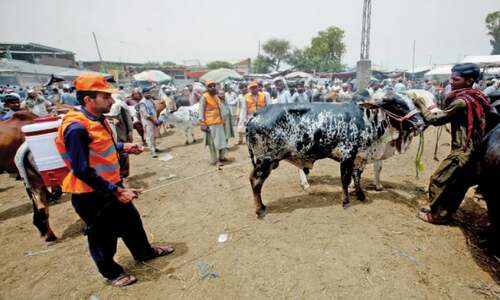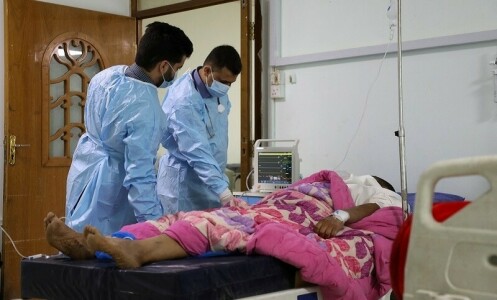KARACHI: Advising extreme caution in animal handling and slaughter, experts on Wednesday said that vulnerability for falling victim to the tick-borne Crimean Congo Hemorrhagic Fever (CCHF), often referred to as Congo fever, was high during the time of Eidul Azha when animals were offered for sacrifice on a large scale.
They said that the disease often proves deadly due to multiple factors, including the fact that the illness causes sudden blood loss in and outside the body. There isn’t a safe and effective vaccine available and the treatment is largely based on the management of symptoms, they added.
Last month, two CCHF deaths — one in Quetta and the other in Karachi — were reported in the country.
“The risk for infection during this time of the year remains high; though a few cases are reported every year,” shared Dr Rafiq Khanani, president of the Infection Control Society of Pakistan.
Experts ask people to wear gloves, other protective gear while slaughtering animals at home
He said that preventive steps could help significantly reduce the risk of tick-to-human transmission during animal handling and slaughter.
These steps, he pointed out, included wearing protective clothing (long sleeves, long trousers) and wearing light-coloured clothing to allow easy detection of ticks on the clothes.
“People can wear gloves and other protective clothing while handling animals or their tissues during slaughtering, butchering and culling procedures in slaughterhouses or at home,” he said.
He added that healthcare providers managing CCHF patients were very vulnerable to the infection and needed to adopt all necessary infection control measures.
“Human-to-human transmission can occur resulting from close contact with the blood, secretions, organs or other bodily fluids of infected persons. In Pakistan, several cases have been reported in hospitals where the disease was transmitted to healthcare providers managing the patients. Therefore, hospital administrations need to ensure that infection control measures are in place,” he said.
Explaining why Congo fever has a high mortality rate, Dr Abdul Ghafoor Shoro, a senior general physician, said several factors were responsible for this phenomenon.
“One is the fact that the patient’s condition deteriorated very fast due to sudden blood loss. The illness causes severe haemorrhage, abnormal blood clotting in vessels and multi-organ failure,” he said, while emphasising the need for proper disposal of animal remains.
According to experts, CCHF is caused by a Nairovirus of the Bunyaviridae family. Its hosts include a wide range of wild and domestic animals such as cattle, sheep and goats.
Animals become infected by the bite of infected ticks and the virus remains in their bloodstream for about one week after infection, allowing the tick-animal-tick cycle to continue when another tick bites. Although a number of tick genera are capable of becoming infected with CCHF virus, ticks of the genus Hyalomma are the principal vector.
The majority of cases have occurred in the people involved in the livestock industry, such as agricultural workers, slaughterhouse workers and veterinarians.
The length of the incubation period depends on the mode of acquisition of the virus. Following infection by a tick bite, the incubation period is usually one to three days, with a maximum of nine days.
Onset of symptoms is sudden, with fever, myalgia, (muscle ache), dizziness, neck pain and stiffness, backache, headache, sore eyes and sensitivity to light.
“There may be nausea, vomiting, diarrhoea, abdominal pain and sore throat early on, followed by sharp mood swings and confusion. After two to four days, the agitation may be replaced by sleepiness, depression and lassitude, and the abdominal pain may localise to the upper right quadrant, with detectable liver enlargement,” according to the WHO.
Published in Dawn, June 29th, 2023














































Dear visitor, the comments section is undergoing an overhaul and will return soon.